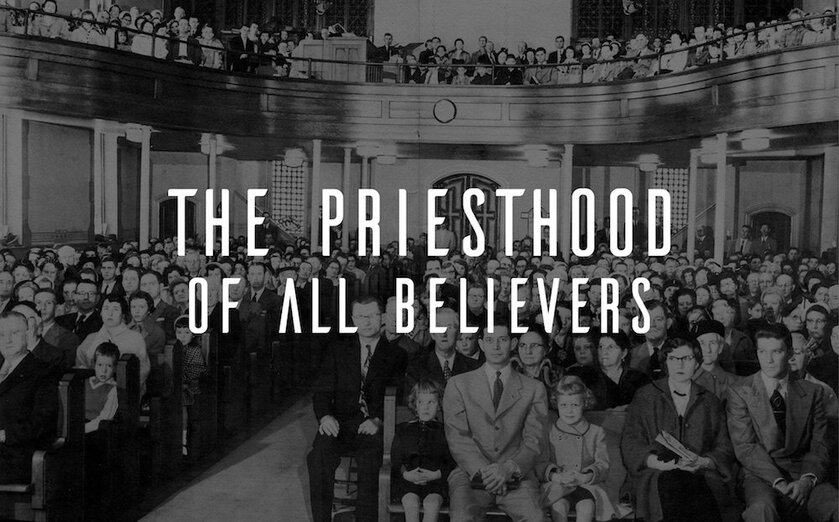The Sons of Sceva: Exposed Counterfeits in the Midst of True Power
Acts 19:11-12
"And God was doing extraordinary miracles by the hands of Paul, so that cloths or aprons were even carried from his body to the sick, and the diseases left them and the evil spirits went out."
These passages in Acts 19:11-20 offer a powerful look into the contrast between authentic spiritual authority rooted in God and the human tendency to mimic or commodify it through rituals, blended traditions, and objects.
This scene unfolds during Paul’s ministry in Ephesus, a city steeped in idolatry, magic, and spiritual curiosity. The Holy Spirit was moving mightily, demonstrating God’s kingdom through undeniable signs. Here, God uses everyday items, handkerchiefs (likely sweaty rags) and aprons (work garments from Paul’s tentmaking), as conduits for healing and deliverance. Notice the emphasis: It’s God doing the miracles through Paul. The cloths aren’t inherently magical; they’re points of contact for faith, apparently saturated with the anointing of a man fully yielded to the Holy Spirit. Though why the anointing of The Holy Spirit would transfer through sweat is not clear, except that God himself wanted it to be so. But this does echo Old Testament precedents, like Elijah’s mantle (2 Kings 2:8-14) or the hem of Jesus’ garment (Mark 5:25-34), where objects become extensions of divine power, not substitutes for it.
The passage quickly pivots to a cautionary tale in verses 13-16 with the seven sons of Sceva. These itinerant Jewish exorcists see Paul’s success and try to replicate it formulaically:
Acts 19:13-16
"But also some of the Jewish exorcists, who went from place to place, attempted to invoke over those who had the evil spirits the name of the Lord Jesus, saying, "I implore you by Jesus whom Paul preaches." Now seven sons of one named Sceva, a Jewish chief priest, were doing this. And the evil spirit answered and said to them, "I recognize Jesus, and I know about Paul, but who are you?" And the man, in whom was the evil spirit, leaped on them, subdued all of them, and utterly prevailed against them, so that they fled out of that house naked and wounded."
They treated Jesus’ name like a spell, detached from any real personal relationship with Christ or genuine authority to act in his name. And like a scene from a Hollywood movie, the demon’s response exposes their fraud. The result? Humiliation and violence, as the possessed man overpowers them. And that must have been one hell of a fight, pun intended, since these exorcists ended up naked and afraid.
This contrast is the heart of the chapter: Genuine power flows from intimacy with God (as in Paul’s case), while counterfeit attempts, relying on rituals, names, or objects without true faith, lead to failure and exposure. The aftermath was fear taking hold of the people. But even this was likely part of God's plan. Fear of God spreads quickly, believers are confessing their sins, sorcerers are burning their occult books (worth a fortune apparently, about 50,000 days’ wages), and the Gospel advances. It’s a call to purity, rejecting any blend of faith with magic or self-effort. So, I suppose we can call this all a good day's work, in spite of all its quirks.
When I first read these passages, I was immediately reminded of some radio and television ministers who would market handkerchiefs or spring water that supposedly had been blessed with Spirit powers. Especially in some charismatic and Pentecostal circles, prayer cloths or handkerchiefs have been distributed, or sold, as tools for healing, often citing Acts 19 as precedent. For instance, with Rod Parsley ministries, events like annual "miracle, healing, and victory prayer cloth services" invite people to submit requests, with cloths prayed over and mailed out, sometimes tied to donations. And other online shops even offer "verses of healing prayer cloths" or pastor towels imprinted with Scriptures, marketed for baptismal or personal use. And I suppose we can apply this trend to other things as well, like social media memes even, and the perennial clickbait posts that must be liked or shared if one hopes to receive and recognize their faith in Jesus. A good old-fashioned chainmail revival.
Is it faith in God, or faith in the cloth?
The commercialization raises red flags for me.
In our consumer-driven culture, this temptation is amplified. Social media amplifies "faith healers" promising breakthroughs via mailed artifacts, but the Bible urges discernment:
1 John 4:1
"Test the spirits to see whether they are from God".
This Ephesus story reminds us that authentic revival leads to repentance and renunciation of hidden sins, not reliance on talismans or fetishes.
It reveals a timeless human impulse: attempting to harness spiritual power through manmade means, like buying "blessed" items or reciting prayers without a heart transformation. Jesus warned against such practices, condemning those who...
Matthew 15:8
"They honor me with their lips, but their hearts are far from me".
True power isn’t for sale, it’s freely given through the cross and the indwelling Spirit, and we've seen this before, (Acts 8:18-20, where Simon the sorcerer tries to buy the Holy Spirit’s power).
It’s a compelling reflection on the quirks and profundities of God’s work in Ephesus. Some commentators suggest it’s God’s way of humbling human pride, and at the same time, rebuking Ephesus’s pagan religions, which relied on elaborate charms and rituals. By using sweat-soaked rags from Paul’s manual labor, God shows His power operates through the ordinary and unclean, to authenticate Paul’s message and draw people to genuine faith. This juxtaposition is central: True power stems from intimacy with God, as in Paul’s yielded life, while counterfeit efforts; treating names, rituals, or objects as spells without authentic faith, ends in failure and humiliation.
For example, there have been many even in recent history that have continued in these counterfeit products. Evangelists like William Branham, T. L. Osborn, David Taylor, Smith Wigglesworth, Aimee Semple McPherson, Oral Roberts, Robert Tilton, and my personal favorite Peter Popoff, have all preached a prosperity gospel and solicited funds by selling handkerchiefs or other objects as well as traditions as blessed by "The Spirit". Whether it's tied to "seed-faith" giving, or purchasing mailed anointed cloths, they all had their gimmicks. And some have extended these items into all sorts of other talismans. If it can be imagined, it can be blessed by the "Prophet" or so called "Apostle".
These "leaders" often cited Acts 19:11-12 as justification, viewing cloths as faith touchpoints rather than magical objects. While miraculous testimonies abound, skeptics argue many of these practices bordered on exploitation. And amid many scandals these "ministers" have proven to be complete frauds for the most part. The commercial aspect, especially in later televangelism, resembles closely the counterfeit rituals warned against in the same chapter of Acts (see the sons of Sceva).
Today's devotion study is a divine call to reject syncretism which is at the heart of this fraud, (blending faith with magic, local traditions or self-reliance), and instead pursue purity. But this practice isn't limited to late night infomercials, syncretism, at its core, refers to the merging or assimilation of originally distinct traditions, particularly in theology, mythology, and religious practices. It’s a process where elements from multiple belief systems combine to form something new, often as a result of cultural contact, conquest, migration, or adaptation.
Other examples of this same spirit:
The Virgin of Guadalupe appearing with indigenous features, blending Catholic Marian devotion with the Aztec goddess Tonantzin. This is a classic colonial syncretism, where Christianity overlaid but didn’t erase pre-existing beliefs, leading to many unorthodox hybrid rituals. And this explains the fetishized Marian practices that have grown up out of this blending among many in the Roman Catholic community.
Other traditions, Santería (Cuba), Candomblé (Brazil), Vodou (Haiti), and African loa (spirits), have equated with Catholic saints and become a form of subversive assimilation. This sort of thing couldn't happen if the door hadn't been opened by the all-too-common mystic practices encouraged by the Catholic traditions.
Sufi mystics incorporated Hindu bhakti (devotional) practices, yoga, and concepts like karma into Islamic spirituality, resulting in shared saints and shrines venerated by both communities.
Mani is a dualistic religion blending Zoroastrianism, Christianity, Buddhism, and Gnosticism. It's portrayed as a cosmic battle between light and darkness, incorporating Jesus as a prophet alongside Buddha and Zoroaster. Be careful when you hear talk about how Persian people who are "Christian", likely they are a hybrid of Zoroasterism.
In the 4th century BCE, Alexander’s conquests fused Greek polytheism with Eastern traditions. Greek gods like Zeus were identified with Egyptian Amun (as Zeus-Ammon) or Persian Ahura Mazda, leading to hybrid cults like that of Serapis in Ptolemaic Egypt, a deliberate creation combining Osiris and Apis to appeal to both Greeks and Egyptians.
These all reflect an eclectic syncretism, where selective elements are borrowed to strengthen political or cultural unity. It's the same spirit we saw at work in Ephesus in Acts 19. Spiritual people trying to make something new out of the power of the Holy Spirit they see at work around them, by blending it with their own beliefs.
Some would say the same about many modern western Christian beliefs. For instance, some argue that the Christian celebration of Jesus’ birth on December 25 absorbed Roman Saturnalia (a winter solstice festival honoring the sun god) and Germanic Yule traditions, including evergreen trees and gift-giving. And the same can be said of new age movements that combined Hinduism, Buddhism, Kabbalah, Freemasonry, Unification Church, Confucianism, shamanism. It's all a compromise of some religious system to blend it into the culture at large. And this applies to secularism bleeding into Christian worship as well.
In the Bible, syncretism appears as a cautionary theme. For example, Israel’s blending of Yahweh worship with Canaanite idols (Judges 2:11-13) or the sons of Sceva in Acts 19 mixing Jesus’ name with magical formulas. Christianity historically views it all as a "subtle sin," prioritizing exclusive devotion (Exodus 20:3).
Syncretism indeed enriches religious diversity by spreading the gospel throughout the entire world, but it remains a risk if it is eroding the core truths of faith. As history shows, it’s inevitable in our diverse interconnected worlds, yet discernment still remains the key, testing these blends against foundational beliefs is critical to our understanding and survival.
Prayer:
Lord Jesus, protect us from imitating faith without knowing You intimately. Like the sons of Sceva, may our failures drive us to genuine surrender, magnifying Your Holy name alone. Amen.



















